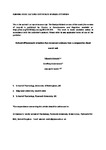Cultural differences in attention: Eye movement evidence from a comparative visual search task.
| dc.contributor.author | Alotaibi, A | |
| dc.contributor.author | Underwood, G | |
| dc.contributor.author | Smith, Alastair | |
| dc.date.accessioned | 2017-09-27T10:28:59Z | |
| dc.date.issued | 2017-10 | |
| dc.identifier.issn | 1053-8100 | |
| dc.identifier.issn | 1090-2376 | |
| dc.identifier.uri | http://hdl.handle.net/10026.1/9991 | |
| dc.description.abstract |
Individual differences in visual attention have been linked to thinking style: analytic thinking (common in individualistic cultures) is thought to promote attention to detail and focus on the most important part of a scene, whereas holistic thinking (common in collectivist cultures) promotes attention to the global structure of a scene and the relationship between its parts. However, this theory is primarily based on relatively simple judgement tasks. We compared groups from Great Britain (an individualist culture) and Saudi Arabia (a collectivist culture) on a more complex comparative visual search task, using simple natural scenes. A higher overall number of fixations for Saudi participants, along with longer search times, indicated less efficient search behaviour than British participants. Furthermore, intra-group comparisons of scan-path for Saudi participants revealed less similarity than within the British group. Together, these findings suggest that there is a positive relationship between an analytic cognitive style and controlled attention. | |
| dc.format.extent | 254-265 | |
| dc.format.medium | Print-Electronic | |
| dc.language | en | |
| dc.language.iso | en | |
| dc.publisher | Elsevier BV | |
| dc.subject | Culture | |
| dc.subject | Eye movements | |
| dc.subject | ScanMatch | |
| dc.subject | Visual attention | |
| dc.subject | Visual search | |
| dc.title | Cultural differences in attention: Eye movement evidence from a comparative visual search task. | |
| dc.type | journal-article | |
| dc.type | Journal Article | |
| dc.type | Research Support, Non-U.S. Gov't | |
| plymouth.author-url | https://www.ncbi.nlm.nih.gov/pubmed/28946046 | |
| plymouth.volume | 55 | |
| plymouth.publication-status | Published online | |
| plymouth.journal | Conscious Cogn | |
| dc.identifier.doi | 10.1016/j.concog.2017.09.002 | |
| plymouth.organisational-group | /Plymouth | |
| plymouth.organisational-group | /Plymouth/Faculty of Health | |
| plymouth.organisational-group | /Plymouth/Faculty of Health/School of Psychology | |
| plymouth.organisational-group | /Plymouth/REF 2021 Researchers by UoA | |
| plymouth.organisational-group | /Plymouth/REF 2021 Researchers by UoA/UoA04 Psychology, Psychiatry and Neuroscience | |
| plymouth.organisational-group | /Plymouth/Users by role | |
| plymouth.organisational-group | /Plymouth/Users by role/Academics | |
| plymouth.organisational-group | /Plymouth/Users by role/Researchers in ResearchFish submission | |
| dc.publisher.place | United States | |
| dcterms.dateAccepted | 2017-09-07 | |
| dc.rights.embargodate | 2018-9-23 | |
| dc.identifier.eissn | 1090-2376 | |
| dc.rights.embargoperiod | 12 months | |
| rioxxterms.versionofrecord | 10.1016/j.concog.2017.09.002 | |
| rioxxterms.licenseref.uri | http://www.rioxx.net/licenses/under-embargo-all-rights-reserved | |
| rioxxterms.licenseref.startdate | 2017-10 | |
| rioxxterms.type | Journal Article/Review |


